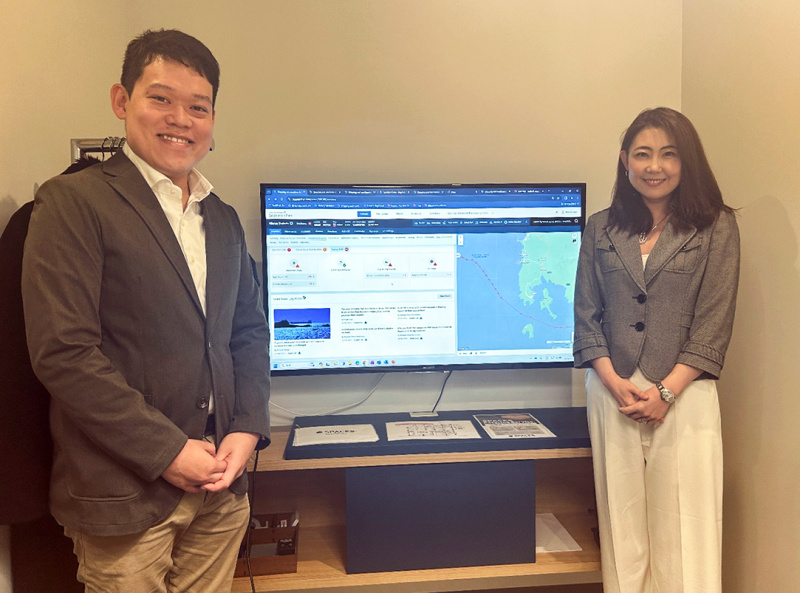
There would hardly be anyone in the shipping industry who does not know Lloyd’s List. The history of the paper dates back to 1734 when it was a place for exchanging shipping information in a London coffeehouse, making it the world’s oldest specialist shipping paper. Since its early days, “Shipping News” started in the form of ships’ arrivals and departures, and navigational logs. Lloyd’s List Intelligence, with its roots in “Shipping News,” now gathers information daily from more than 100,000 vessels worldwide. At present, challenges like the diversion of ships through the Red Sea and the Suez Canal have emerged. I spoke with the Head of Sales, Ms. Yuan Li, who emphasized the importance of accurate information in uncertain times. Account Manager Hiroaki Sakai was also present during the interview. (Interviewer: Hirofumi Yamamoto)
JMD: Firstly, please tell me about the overview of Lloyd’s List Intelligence.
“Lloyd’s List Intelligence provides detailed data on vessel movements using AIS (Automatic Identification System), including histories of arrivals and departures, and predictions of next port calls for all types of vessels. What sets us apart from regular services is our ability to provide detailed insights into vessel ownership, credit information, port information, compliance risk ratings and more. We have a diverse clientele including banks, finance institutions, maritime lawyers, insurance, energy and commodity players, and legal professionals. By providing corporate information alongside quantitative data to Lloyd’s List, we aim to enable broad utilization of data across the shipping industry.”
JMD: Recently, Richard Meade, the editor-in-chief of Lloyd’s List, appeared on the BBC, discussing the movements in the Red Sea and the Suez Canal. The data he presented was from Lloyd’s List Intelligence.
“Lloyd’s List is a media outlet with journalists delivering information daily. With over 300 years of history, Lloyd’s List Intelligence focuses on data, holding AIS information for over 570,000 vessels (from large commercial vessels to domestically trading barges), data on over200,000 ship-owning and operating companies, and approximately 13,100 ports, 15,600 terminals, and 42,700 berths. Our advanced processing system handles over 350 data points and our LLI models combine over 1 trillion data points to power Seasearcher predictive analytics and risk ratings. “
“We have major offices in the UK, US, Singapore, Japan, China, and. They work around the clock to acquire information from numerous sources, and within Lloyd’s Agency Network, consisting of 500 agents and sub-agents, to construct our data. Lloyd’s List Intelligence delivers this data to our customers.”
JMD: In recent times, concerns regarding financial sanctions by the Office of Foreign Assets Control (OFAC) and money laundering have been on the rise within the shipping industry, with many shipping companies, shipowners, and financial institutions expressing apprehension.”
“We aim to address these concerns by promptly providing our customers with information on vessels’ movements, operators, and shipowners that may be in violation of OFAC regulations, allowing for proactive avoidance of crises. For instance, in the case of crude oil, we monitor activities such as ship-to-ship transfers (STS) near sanctioned regions, even if a vessel has disabled their tracking system.”
“Recently, there have been suspicious vessels navigating without AIS signals, especially in areas like the Red Sea, North Korea, and Central America. Lloyd’s List Intelligence can deduce a vessel’s navigation history even if AIS signals are turned off, by obtaining subsequent position information and deducing its voyage history from that location.”
“In February we also launched AIS spoofing detection. Spoofing cases have gone by 50% in the past year-it describes an event when a vessel deliberately transmits false AIS to conceal its true location. Up until now, it has been extremely difficult to reliably identify spoofing. Our ground-breaking methodology changes that. Our machine-learning detects patterns where a vessel may deliberately spoofing their AIS message, which is then verified using vast AIS messages, which are then verified using our vast AIS proprietary network to understand its true location.”
JMD: The ownership of Lloyd’s List shifted from Informa Group to Montagu in 2022. Has this had any impact?”
“Montagu is a private equity fund that has been strengthening its focus on technology and data analytics leadership. Apart from Lloyd’s List Intelligence, they also possess a research division with a global network. They have positioned Lloyd’s List Intelligence as a significant department to further enhance our position in the shipping industry.”
JMD: What efforts are being made regarding the Japanese market?”
“Currently, our Japan office consists of a team of five staff members. We are utilized by approximately 80% of the world’s largest financial institutions, 60% of insurance companies, 70% of shipping companies, and 85% of maritime lawyers worldwide. Lloyd’s List Intelligence caters to the needs of these clients globally, and our visibility has been increasing among Japanese shipping companies, shipowners, trading companies, and regional banks. Japan is the world’s third-largest ship-owning country, following Greece and China. Our goal is to further expand the use of Lloyd’s List Intelligence in the Japanese market.”